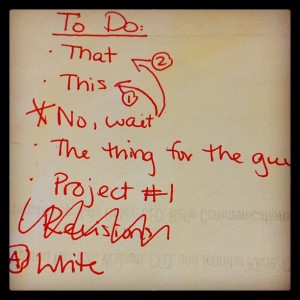 As business owners survey their organizations, they’ll likely notice their productive people – those employees expert at accomplishing lengthy task lists without breaking a sweat.
As business owners survey their organizations, they’ll likely notice their productive people – those employees expert at accomplishing lengthy task lists without breaking a sweat.
In a Inc.com post, contributor Kevin Daum shares six tips for being more productive each day, based on his observations into the lives of extremely productive people.
It doesn’t matter whether the goal is achieving a certain level of financial success or making a commitment to get healthier, lasting productivity centers on making conscious decisions about what demands your attention and what can wait.
“With most endeavors, you can either go deep or go wide. Focus on spending time that for you is fun and productive.”
Choosing and understanding the priorities most important to you will determine how you spend your time most effectively.
Daum notes no one can do everything well, and advises business leaders to design their personal and professional lives to meet their wants, while recognizing that saying no is often a good thing. “Live your life by design, not by default.”
For business leaders, efficiency can be avoiding the distractions that don’t advance their business goals or delegating whenever possible.
There are countless blog posts written about the pursuit of work-life balance, but Daum takes a different approach.
“Stop trying to balance time between friends, family, work and play. Find ways to enjoy them in a combined manner.” Rather than balance, blend and integrate activities and passions.
Social media, conversations around the water cooler, and interpersonal relationships can monopolize your time and drain your productivity if you let them. Treat your daily work day like a budget, and allocate resources accordingly.
Keep interactions and conversations that don’t support your business goals to a minimum and you’ll accomplish more every day.
The most productive people always seek out opportunities to learn new skills, especially if it helps them work more efficiently by freeing up their hands for larger priorities.
“Always be looking for a new way to gain back an hour here or there,” says Daum.
By actively looking for ways to improve on current practices and ways of working, you’ll pick up little tips and tricks to help you work smarter, not harder.
Prioritizing activities and managing time-wasters can help, but sometimes a few things will remain on your to-do list from the day or week before.
That’s perfectly acceptable, says Daum.
The important thing to remember about productivity is it’s about developing new, healthy habits, and constantly reinforcing them.
What productivity tips do you have?
 We all want to be more productive in our daily lives — accomplishing more in less time, completing major projects without getting overwhelmed by the size or scope, and simply being more efficient.
We all want to be more productive in our daily lives — accomplishing more in less time, completing major projects without getting overwhelmed by the size or scope, and simply being more efficient.
Jason Womack, productivity trainer and author of Your Best Just Got Better: Work Smarter, Think Bigger, Make More, examines three factors that can make or break your productivity in an article for Entrepreneur.
What are Your Routines?
Womack encourages people to examine their daily routines closely, and run through an assessment of how they manage their to-do lists.
“You know you’ve normalized your workflow if, when you do something a different way, or chose not to do it altogether, it feels as if something is missing or wrong.”
Routines are important, but Womack notes you shouldn’t become so grounded to your routine that disruptions to those routines severely affect your productivity.
Asking yourself if there’s a better way to complete a task can uncover better processes that increase efficiency.
Where do You Work?
The environment in which we work can have a considerable impact on our overall productivity, says Womack.
As you begin an assessment of your physical working space, Womack suggests you consider the following questions:
“The purpose of asking yourself these questions is to help you think about how context influences you in a positive or negative way. When you want to get something important done, change your context.”
Context is important to different kinds of work that you encounter in any given day. Problem-solving, strategic planning, and responding to customer inquiries or complaints involve different skills and context to accomplish quickly and effectively.
By experimenting with context, Womack suggests that you’ll get a better idea of how physical conditions impact your thinking and overall productivity.
Who do You Spend the Most Time With?
Your relationship with coworkers and those in your personal and professional networks can have significant influences over your productivity, mindset, and behavior.
Seek out mentors and coaches who align closely with your goals and actively encourage your personal and professional development, and avoid those people whose work habits don’t mesh with yours.
Womack suggests auditing your personal and professional relationships regularly, “ranking them by how supportive they are towards your productivity.”
Honestly assessing how you work best will make it easier to identify new and improved ways of doing more.
What tips do you have to be more productive?
